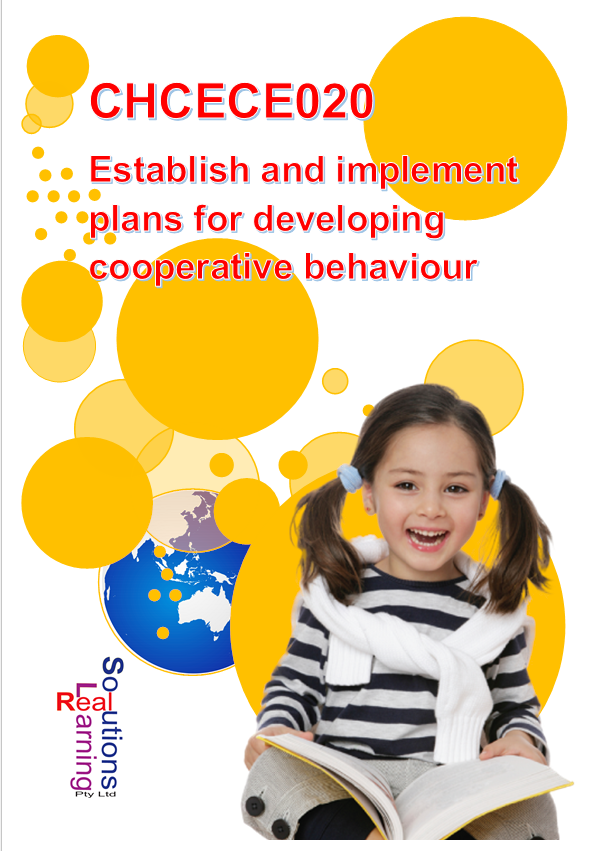CHCECE020 - Establish and implement plans for developing cooperative behaviour
SKU:
CHCECE020
A$495.00
A$495.00
Unavailable
per item
$544.50 inc GST - GST will be charged on checkout
This unit describes the skills and knowledge required to support both individual and group plans for developing cooperative behaviour.
This unit applies to educators working in a range of education and care services.
No licensing, legislative or certification requirements apply to this unit at the time of publication.
What we give you in the package:
Our package is delivered to you in CD (electronic) format, our materials contain references and links to topical literature and MS Word documents; including
Our resources are able to be contextualised and replicated as you see fit.
Our licence allows you to reprint, badge, remove, and add materials to your specifications – if you feel it necessary.
Our resources still offer you the breadth, depth and complexity of knowledge and competencies covering selecting, adapting and transferring skills and knowledge to new environments.
Our resources still provide you with the technical advice and early leadership skills for problem resolution.
The licence allows for use online
This unit describes the skills and knowledge required to support both individual and group plans for developing cooperative behaviour.
This unit applies to educators working in a range of education and care services.
No licensing, legislative or certification requirements apply to this unit at the time of publication.
What we give you in the package:
Our package is delivered to you in CD (electronic) format, our materials contain references and links to topical literature and MS Word documents; including
- comprehensive candidate’s workbooks;
- candidate’s assessment tools;
- trainer’s marking guides;
- PowerPoint presentation/s;
- competency assessment mapping against:
o performance criteria;
o foundation skills;
o performance evidence;
o knowledge evidence.
Our resources are able to be contextualised and replicated as you see fit.
Our licence allows you to reprint, badge, remove, and add materials to your specifications – if you feel it necessary.
Our resources still offer you the breadth, depth and complexity of knowledge and competencies covering selecting, adapting and transferring skills and knowledge to new environments.
Our resources still provide you with the technical advice and early leadership skills for problem resolution.
The licence allows for use online
Performance Evidence
The candidate must show evidence of the ability to complete tasks outlined in elements and performance criteria of this unit, manage tasks and manage contingencies in the context of the job role. There must be demonstrated evidence that the candidate has completed the following tasks:
The candidate must be able to demonstrate essential knowledge required to effectively do the task outlined in elements and performance criteria of this unit, manage the task and manage contingencies in the context of the identified work role.
These include knowledge of:
Skills must be demonstrated in a regulated education and care service.
In addition, simulations and scenarios must be used where the full range of contexts and situations cannot be provided in the workplace or may occur only rarely. These are situations relating to emergency or unplanned procedures where assessment in these circumstances would be unsafe or is impractical.
Simulated assessment environments must simulate the real-life working environment where these skills and knowledge would be performed, with all the relevant equipment and resources of that working environment.
Assessment must ensure use of:
The candidate must show evidence of the ability to complete tasks outlined in elements and performance criteria of this unit, manage tasks and manage contingencies in the context of the job role. There must be demonstrated evidence that the candidate has completed the following tasks:
- observed and analysed children’s behaviour, on at least three occasions, in a range of situations and contexts
- created, implemented and measured the effectiveness of at least one plan, including:
- developing long-term and short-term goals and objectives
- establishing a baseline for the behaviour
- clearly outlining alternative behaviours
- communicating expectations with children
- supporting and communicating with colleagues to implement the plan
- revisiting the plan and reflecting on its effectiveness
- developed positive relationships with children, respected family expectations and their cultural values, and acted within the service policy
- interacted with children and involved them in decision-making and planning.
The candidate must be able to demonstrate essential knowledge required to effectively do the task outlined in elements and performance criteria of this unit, manage the task and manage contingencies in the context of the identified work role.
These include knowledge of:
- how to access:
- the National Quality Framework
- the National Quality Standards
- the relevant approved learning framework
- how to interpret the relevance of framework and standards documents in guiding work in this unit of competency
- stage of development/age-appropriate expectations of children’s behaviour
- appropriate and inappropriate behaviours – review of own stance and reflection on own values
- different family styles of discipline and beliefs about behaviour in different cultures and social groups
- relationship-based strategies to help children learn about behaviour
- possible contributing factors to behaviours of concern, i.e. recent events, child’s history, actions of others, or developmental or emotional reasons
- code of ethics
- United Nations Conventions on the Rights of the Child
- organisation standards, policies and procedures.
Skills must be demonstrated in a regulated education and care service.
In addition, simulations and scenarios must be used where the full range of contexts and situations cannot be provided in the workplace or may occur only rarely. These are situations relating to emergency or unplanned procedures where assessment in these circumstances would be unsafe or is impractical.
Simulated assessment environments must simulate the real-life working environment where these skills and knowledge would be performed, with all the relevant equipment and resources of that working environment.
Assessment must ensure use of:
- National Quality Framework for Early Childhood Education and Care
- the relevant approved learning framework under the National Quality Framework for Early Childhood Education and Care.
